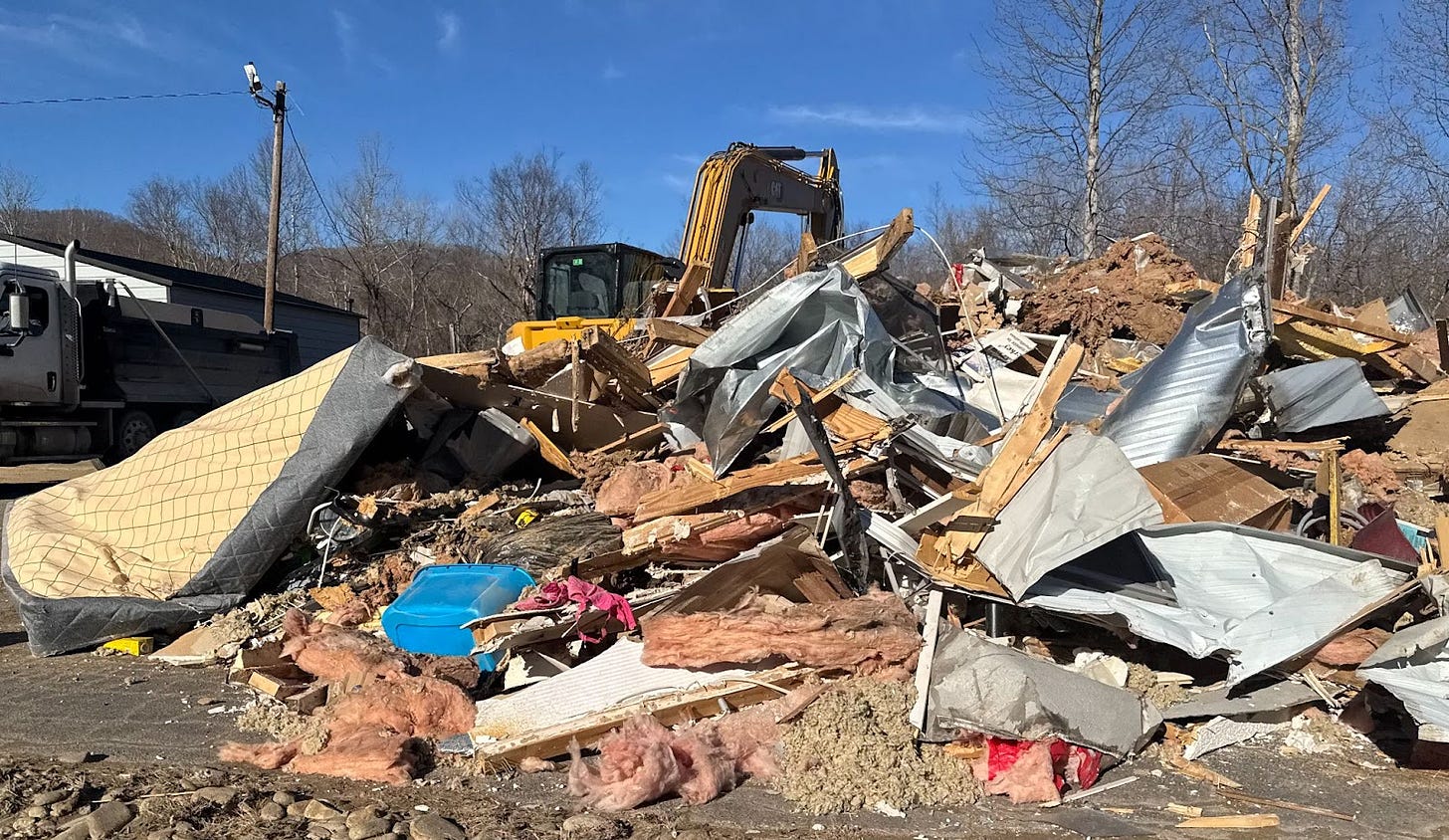When the floods came, she found refuge in a dump truck
Plus: 105th death confirmed; Trump visits Western N.C.; Former UNC coach Roy Williams pledges $10M; Buncombe County tourism hits Covid-era lows; FEMA extends deadline to apply for assistance
You’re reading Mountain Updates, a free pop-up newsletter from The Charlotte Ledger examining the crisis and recovery in the N.C. mountains. Ledger subscribers can add Mountain Updates on their “My Account” page.
Sign up for free:
When Carol McCollum realized the Sept. 27 storm was going to be more than just a little rain, the water outside her mobile home in Swannanoa was already up to her ankles.
“I didn’t even have time to grab shoes,” she said. “I had to walk out barefoot.”
Carol, 78, had lived in that mobile home for 28 years with her son, Bobby, 40. Last month, I picked up Carol at her relative’s house where she’s been staying for four months, and she asked if we could drive by her home. We parked in front of a pile of debris on the side of U.S. 70 — the unrecognizable remains of her trailer and belongings. The memory of that day so clearly began to replay itself in her mind.
Carol McCollum’s mobile home of 28 years in Swannanoa was left uninhabitable after Hurricane Helene struck Western North Carolina. Her home was officially torn down last month and left in a pile on the side of U.S. 70.
The morning of Helene’s strike, when it became clear they needed to leave, Carol and her son stepped out on their porch in search of higher ground. The only thing in sight was a dump truck about 15 to 20 yards away.
She and her son waded their way to the truck, hoping that it was unlocked. They fought the strong current and knee-high waters that unsteadied Carol’s aluminum walker, and using all of her strength, Carol was able to climb into the truck’s cabin with the help of her son.
For a couple of hours, they watched debris float down U.S. 70, praying that the dump truck would stay put. She saw picnic tables, cars and washing machines float by. She even saw a small beaver-like animal clinging to a piece of wood.
“It was like a parade,” she told me.
The water eventually subsided a few hours later, and Carol and her son climbed out of the truck to inspect their home. It had moved several feet, and everything inside was covered in mud. She was able to salvage a few books, but that was it. Mementos she had collected over 28 years of her life were gone in just a few hours.
When the roads cleared, a family member who lives in Swannanoa came to get them. Carol and Bobby have been staying with them ever since. She says she’s waiting for a sign from God on what to do next.
For the hundreds of folks who have been displaced by Hurricane Helene, it’s unclear how the story will end. More than 13,000 households across Western North Carolina have used a Federal Emergency Management Agency program that pays for hotel or motel stays for people displaced by Helene. About 2,600 families, including 669 in Buncombe County, are currently using the program.
It’s a housing crisis. Rebuilding a home is expensive, and affordable temporary and long-term housing is hard to come by. Fortunately, community startup groups and nonprofits have been stepping in to help.
➡️ You can read more in an article The Ledger published Wednesday.
Here’s the latest news on Western North Carolina’s recovery:
105th person found dead: North Carolina officials have confirmed a 105th fatality related to Hurricane Helene after a body was discovered in Buncombe County on Dec. 20. Of the total deaths, 43 were recorded in Buncombe. The exact cause of death for the latest victim has not been determined, and officials have not released personal details. (Blue Ridge Public Radio)
$500M recovery bill proposed: North Carolina Republican lawmakers have proposed a $500 million recovery package for Hurricane Helene, less than half of the $1.07 billion requested by Democratic Gov. Josh Stein. The plan includes funding for home reconstruction, farmers and infrastructure repairs but omits Stein’s requests for business grants, local government reimbursements and school aid. Lawmakers view the proposal as a starting point, with additional funding expected later. (WLOS)
Trump visits NC: Last month, President Trump announced plans to overhaul FEMA via executive order while touring flood-ravaged North Carolina and wildfire-stricken California, criticizing the agency as too bureaucratic. In North Carolina, he pledged to fast-track disaster relief, and in California, he vowed to cut federal permit requirements for rebuilding. (NPR)
Roy Williams donates $10M to relieve debt of survivors: Legendary UNC basketball coach Roy Williams is helping eliminate $10 million in debt for 6,500 Hurricane Helene survivors in Western North Carolina, partnering with Verizon and ForgiveCo to provide financial relief. Williams, an Asheville native, will personally call affected families to share the news, calling it a "privilege" to support his home state. (WBTV)
Asheville, Buncombe County tourism revenue hits Covid-era lows: The Buncombe County Tourism Development Authority expects a significant revenue decline due to Hurricane Helene, projecting $22.8 million for the 2025 fiscal year — down $11.5 million from initial estimates. The drop is the lowest since the pandemic. While hotel demand is up, vacation rentals have suffered a 23% decline. (Blue Ridge Public Radio)
Remembering the 104 lives lost: The Charlotte Observer and The News & Observer in Raleigh partnered on a project to write obituaries for the 104 lives lost in Hurricane Helene. (This project was published before the 105th person was confirmed dead in Buncombe County.)
FEMA extends deadline to apply: FEMA has extended the deadline for North Carolinians affected by Hurricane Helene to apply for assistance until March 8, 2025. Aid covers housing, home repairs, personal property and disaster-related expenses. (Blue Ridge Public Radio)
Eric Church rebuilding Avery County homes: Country music star and North Carolina native Eric Church is making progress on his pledge to build 100 homes for Avery County residents displaced by Hurricane Helene. His nonprofit, Chief Cares, has secured land for a new neighborhood of 40-50 homes, with construction set to begin in April and move-in expected by June. Church headlined the “Concert for Carolina” benefit concert in October with Luke Combs that raised $24 million for relief efforts. (WCNC)
Lindsey Banks, a native of the Buncombe County town of Swannanoa, is a staff reporter with The Charlotte Ledger. Reach her at lindsey@cltledger.com.
How to help
Many organizations have deployed groups across the region, tasked with distributing food, water and supplies. You can donate to their efforts at the links below.
Hearts with Hands, a local disaster relief organization, has a donation page to provide food, supplies and water.
United Way of North Carolina has established a fund to help residents affected by the flooding.
MANNA Foodbank, which serves 16 counties in Western North Carolina, is accepting food, supplies and monetary donations. The organization’s warehouse on Swannanoa River Road in Asheville was damaged by the hurricane.
Samaritan’s Purse, which is headquartered in Boone, is scheduling volunteers to help with debris cleanup.
Operation Blessing has a donation page to provide food, supplies and water.
Need to sign up for this e-newsletter? We offer a free version, as well as paid memberships for full access to all 4 of our local newsletters:
The Charlotte Ledger is a locally owned media company that delivers smart and essential news. We strive for fairness and accuracy and will correct all known errors. The content reflects the independent editorial judgment of The Charlotte Ledger. Any advertising, paid marketing or sponsored content will be clearly labeled.
◼️ About The Ledger • Our Team • Website
◼️ Newsletters • Podcast • Newcomer Guide • A Better You email series
◼️ Subscribe • Sponsor • Events Board • Merch Store • Manage Your Account
◼️ Follow us on Facebook, Instagram, X/Twitter, LinkedIn, Substack Notes





